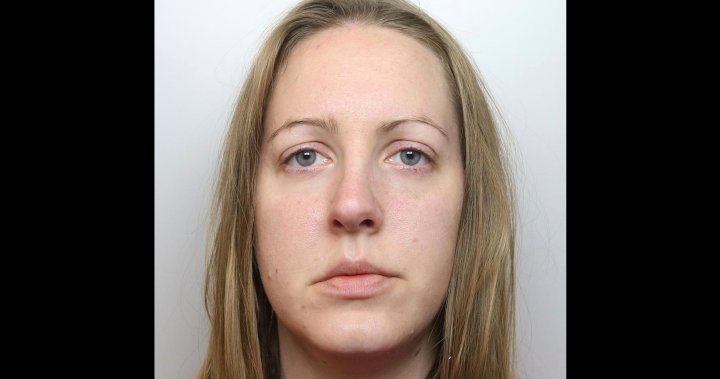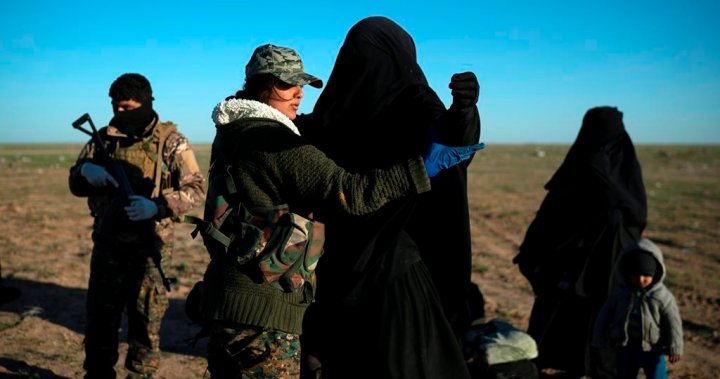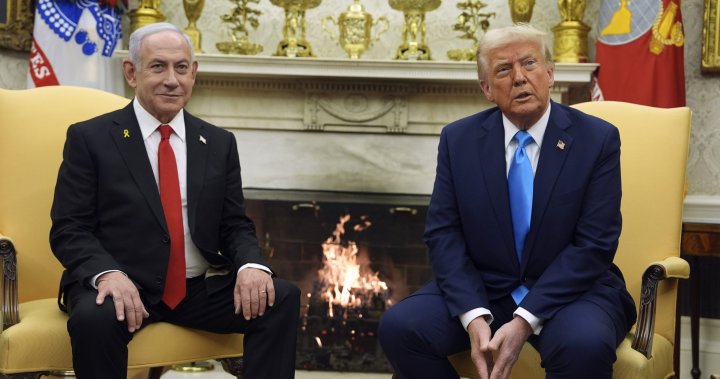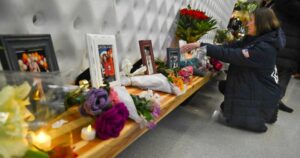A US-backed Syrian Democratic Forces fighter searches a man evacuated from the last territory of ISIS, Baghouz, Syria, on February 22, 2019 (AP Photo/Felipe Dana, File).

“Battlefield evidence” collected in Syria is beginning to appear in Canadian courts in cases against suspected ISIS members, a Global News investigation has found.
ISIS documents and electronic files seized from captured fighters are being used for the first time in Canada to overcome the challenges of holding so-called foreign fighters accountable.
The material, which has now appeared in courts in two counties, is the product of Operation Gallant Phoenix, a US-led effort to share what is known as Combined Exploitable Material (CEM).
CEM is evidence found on the battlefield, and can include papers and data collected from the pockets, phones and laptops of fighters captured during combat.
It’s part of an effort to address Canada’s biggest national security problem: how to bring those who participated in ISIS in Syria and Iraq to justice.
Such evidence has already been used to convict ISIS members in the United States, but experts and officials said it faces hurdles before it can be treated as credible in Canadian courts.
A Global News investigation has found that the RCMP have already brought CEMs before courts in British Columbia and Alberta, against suspected ISIS members who returned from Syria.
In two of the cases, police asked terrorism courts to restrict the movements of ISIS women in the name of public safety. Both cases were successful.
But prosecutors have not yet tested the CEM in a criminal trial, and a senior RCMP officer said work is underway to use it to bring charges against Canadians who participated in ISIS.
In an exclusive interview with Global News, RCMP Assistant Commissioner Brigitte Gauvin said police “were using CEM, which is compiled exploitable material.”
“We’ve made a lot of progress in obtaining that evidence, and we’re working on a framework so we can use it as evidence in court,” said Goffin, the head of Homeland Security Investigations.
She said it has been used to identify crimes of those the government describes as Canadian Extremist Travelers (CETs), who have left the country to participate in terrorist groups such as ISIS.
“The CEM is very important because it paints a picture, or gives us knowledge, of the role and activities that CET personnel could have committed while in the conflict area.”
“We constantly request this type of evidence along with other information or intelligence that we can use to enhance our investigations,” Goffin said.
“It has not been used in prosecutions or tested in court yet, but we are certainly ready to do so.”
Although Canada has been bringing terrorists to trial over the past two decades, in some cases for what they did in war zones, prosecutors have not yet relied on battlefield evidence.
“This is the kind of evidence we haven’t seen yet,” said Michael Nesbitt, a leading national security scholar and associate dean at the University of Calgary’s law school.
He said it could be a boon for prosecutors, but they will have to determine how it was collected and got into the hands of the RCMP.
“The question, as always, will be the validity of the evidence.”
Plaintiffs may have to file affidavits attesting to the origin and continuity of the papers, that is, where they were found and how they were transferred from one agency to another.
In the two cases in which the CEM has already been submitted to Canadian courts, the RCMP provided a description of the “circumstances of capture” for each document.
The use of CEM may be particularly effective against ISIS members given that the terrorist group maintained vast bureaucratic records, in part because it had to govern the territories it occupied.
A log found in Raqqa, Syria, was used as evidence on the battlefield against American ISIS member Imran Ali.
US District Court
Matt Blue, head of the US Justice Department’s counterterrorism division, said foreign terrorist fighters leave “trails of evidence” that can be “a goldmine for prosecutors and investigators.”
He said in his report that materials captured on the battlefields are analysed, indexed and shared Speech in April. “Knowing the amount of evidence we have collected over the years, I know we can bring many more individuals to justice for their criminal activity.”
Last year, such evidence was used to convict Imran AliAn American served in the ranks of ISIS.
“The basis for the criminal charges against Ali was evidence found in two records and two hard drives collected by US authorities,” Blue said.
The government’s push to use it in Canadian courtrooms comes amid a series of arrests in Ontario and Quebec over the summer that served as a reminder that ISIS remains a threat.
On September 4, RCMP arrested Muhammad Shahzeb Khan in Ormstown, Que. A Pakistani living in Canada on a student visa was allegedly on his way to New York to carry out a mass shooting for ISIS at a Jewish center in Brooklyn.
A minor from Toronto was charged in August with terrorism offenses allegedly linked to ISIS, and a father and son from Egypt, Ahmed and Mostafa Al-Didi, were arrested in July as they were allegedly preparing to carry out a mass stabbing on behalf of ISIS in Toronto.
Evidence against the father includes a video in which he was allegedly seen in Iraq using a sword to cut off the feet and hands of a prisoner hanging on a cross.
Additionally, a British court in July convicted Khaled Hussein, an Edmonton resident, of belonging to Al-Muhajiroun, a terrorist group headed by pro-ISIS preacher Anjem Choudary.
A Montreal woman who joined ISIS speaks to Global News in Syria in 2018. She is now back in Montreal.
Global news
But of the nine women who were allegedly part of ISIS and returned from Syria to British Columbia, Alberta, Ontario and Quebec, only three have been charged.
Many other Canadian ISIS women have not yet returned to their country, and Kurdish fighters are still holding at least four Canadian men captured during the fighting in Syria.
In the absence of charges, the RCMP used terrorism peace bonds, which have a lower burden of proof, to reduce the threat posed by returning women.
In one such case, RCMP evidence submitted to court includes “collected exploitable material” about Edmonton resident Amy Vasconez. The RCMP said it was provided by the FBI.
The CEM includes ISIS documents recovered by Kurdish fighters in Tabqa, Syria, bearing the names of ISIS women, their aliases, their husbands, their countries of origin, and their dates of birth.
Among those documents was a notebook recording the names of foreigners who entered ISIS-controlled territory in March 2015. Vasconez and her late husband, Ali Abdul-Jabbar, were allegedly included in the list.
The evidence at the battlefield against Amy Vasconez of Edmonton included her alleged request for weapons training.
Alberta Court
The FBI also provided the RCMP with materials taken from ISIS members fleeing the Euphrates River Valley in February 2019, including Vasconez’s request for military training.
The evidence was used by the Alberta RCMP’s Integrated National Security Enforcement Team to obtain a warrant for Vasconez’s arrest when she returned from Syria last year.
Court records show the materials were part of Operation Gallant Phoenix, which the RCMP said was launched to “consolidate and disseminate evidence collected from the conflict zone in Syria and Iraq.”
Canada has never acknowledged being part of Operation Gallant Phoenix, and Goffin declined to discuss details about CEM’s involvement, saying “there are some sensitivities surrounding that.”
“But certainly the continued collaboration and increased collaboration with our foreign partners, particularly Five Eyes, in this area, and the engagement and use of CEM has certainly been an important tool for us to be able to advance those investigations.”
Operation Gallant Phoenix began in 2013 as a way to “track the flow of foreign terrorist fighters in and out of Iraq and Syria,” according to Reuters. New Zealand Defense Forces website.
“It has since evolved into a platform where partners collect and share information about potential and existing terrorist threats, regardless of the ideology behind those threats.”
Entry form for a Canadian arriving in ISIS territory, with city of Edmonton phone numbers.
A second ISIS suspect, Kimberly Pullman of Squamish, British Columbia, was arrested upon her return to Canada in a case based in part on CEM, according to court records.
The evidence against her included an Arabic-language notebook listing women occupying an ISIS guesthouse in Syria in 2015. The Royal Canadian Mounted Police obtained the notebook from the FBI, which obtained it from the U.S. Department of Defense, according to court records.
The US collected 300 terabytes of CEM, ranging from fingerprints and diaries to letters and data on fighters, according to West Point Counterterrorism Center.
“CEM holds great potential and has been used in important ways to investigate and prosecute foreign terrorist fighters, screen terrorist suspects and place them on a watch list, or block travel,” she said.
Blue, head of the US Justice Department’s counterterrorism division, said the United States had amassed “an extraordinary amount of exploitable material and evidence on the battlefield.”
“And every day, highly trained analysts and investigators sift through that evidence, carefully analyzing it and indexing it for retrieval and sharing.”
Stewart.Bell@globalnews.ca
















